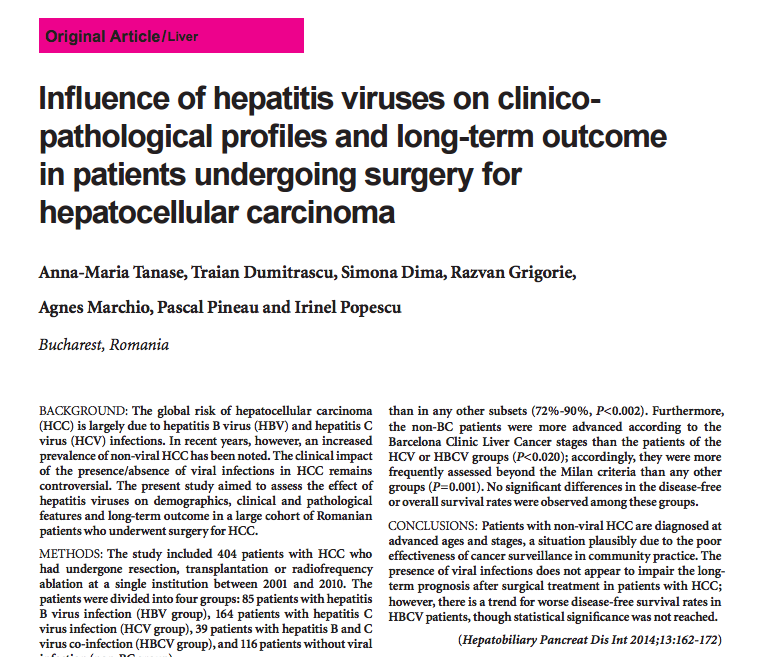Autori:
Anna-Maria Tanase, Traian Dumitrascu, Simona Dima, Razvan Grigorie, Agnes Marchio, Pascal Pineau, Irinel Popescu
Bucharest, Romania
Rezumat:
BACKGROUND: The global risk of hepatocellular carcinoma (HCC) is largely due to hepatitis B virus (HBV) and hepatitis C virus (HCV) infections. In recent years, however, an increased prevalence of non-viral HCC has been noted. The clinical impact of the presence/absence of viral infections in HCC remains controversial. The present study aimed to assess the effect of hepatitis viruses on demographics, clinical and pathological features and long-term outcome in a large cohort of Romanian patients who underwent surgery for HCC.
METHODS: The study included 404 patients with HCC who had undergone resection, transplantation or radiofrequency ablation at a single institution between 2001 and 2010. The patients were divided into four groups: 85 patients with hepatitis B virus infection (HBV group), 164 patients with hepatitis C virus infection (HCV group), 39 patients with hepatitis B and C virus co-infection (HBCV group), and 116 patients without viral infection (non-BC group).
RESULTS: The patients of both HBV (56.0±11.3 years) and HBCV groups (56.0±9.9 years) were significantly younger than those of the HCV (61.0±8.5 years, P=0.001) and non-BC groups (61.0±13.0 years, P=0.002). Interestingly, the prevalence of liver cirrhosis was significantly lower in the non-BC group (47%) than in any other subsets (72%-90%, P<0.002). Furthermore, the non-BC patients were more advanced according to the Barcelona Clinic Liver Cancer stages than the patients of the HCV or HBCV groups (P<0.020); accordingly, they were more frequently assessed beyond the Milan criteria than any other groups (P=0.001). No significant differences in the disease-free or overall survival rates were observed among these groups.
CONCLUSIONS: Patients with non-viral HCC are diagnosed at advanced ages and stages, a situation plausibly due to the poor effectiveness of cancer surveillance in community practice. The presence of viral infections does not appear to impair the long-term prognosis after surgical treatment in patients with HCC; however, there is a trend for worse disease-free survival rates in HBCV patients, though statistical significance was not reached.
METHODS: The study included 404 patients with HCC who had undergone resection, transplantation or radiofrequency ablation at a single institution between 2001 and 2010. The patients were divided into four groups: 85 patients with hepatitis B virus infection (HBV group), 164 patients with hepatitis C virus infection (HCV group), 39 patients with hepatitis B and C virus co-infection (HBCV group), and 116 patients without viral infection (non-BC group).
RESULTS: The patients of both HBV (56.0±11.3 years) and HBCV groups (56.0±9.9 years) were significantly younger than those of the HCV (61.0±8.5 years, P=0.001) and non-BC groups (61.0±13.0 years, P=0.002). Interestingly, the prevalence of liver cirrhosis was significantly lower in the non-BC group (47%) than in any other subsets (72%-90%, P<0.002). Furthermore, the non-BC patients were more advanced according to the Barcelona Clinic Liver Cancer stages than the patients of the HCV or HBCV groups (P<0.020); accordingly, they were more frequently assessed beyond the Milan criteria than any other groups (P=0.001). No significant differences in the disease-free or overall survival rates were observed among these groups.
CONCLUSIONS: Patients with non-viral HCC are diagnosed at advanced ages and stages, a situation plausibly due to the poor effectiveness of cancer surveillance in community practice. The presence of viral infections does not appear to impair the long-term prognosis after surgical treatment in patients with HCC; however, there is a trend for worse disease-free survival rates in HBCV patients, though statistical significance was not reached.
Publicat:
Hepatobiliary Pancreat Dis Int 2014;13:162-172)
[gview file=”https://www.chirurgiehbp.ro/wp-content/uploads/2016/08/ARCHBPTH005.pdf”]

